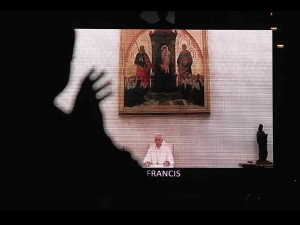Pope Francis: Mabuhay ang Pilipinas!

NEW EVANGELISTS Manila Archbishop Luis Antonio Cardinal Tagle (left, in silhouette) watches Pope Francis’ video address to participants in the Philippine Conference on New Evangelization at the University of Santo Tomas on Friday. VINCENT GO/CONTRIBUTOR
“Bring Jesus now into the world of politics, business, arts, science, technology and social media,” Pope Francis on Friday enjoined the faithful in a video message that concluded the first Philippine Conference on New Evangelization (PCNE).
“Let the Holy Spirit renew the creation and bring forth justice and peace in the Philippines and in the great continent of Asia that is close to my heart,” the Pope added, to enthusiastic applause from more than 5,000 participants from several Asian countries who had packed the Quadricentennial Pavilion (Q-Pav) of the University of Santo Tomas in Manila.
“Don’t get tired of bringing the mercy of the Father to the poor, the sick, the abandoned, the young people and the family,” Pope Francis said, adding that he hoped that through the PCNE, which is an offering to the Year of Faith, “you would experience the presence of Jesus in your lives, that you would love the Church more and that you would share the Gospel to other people with humility and joy.”
“Mabuhay ang Pilipinas! Mabuhay ang Asia! Pagpalain kayo ng Diyos (Long live the Philippines! Long live Asia! May God bless you!),” the Pope said.
Pray for him
Article continues after this advertisementPope Francis also asked the faithful to pray for him. “I need it. I promise to pray for you especially to our mother, the Blessed Virgin Mary, star of the new evangelization.”
Article continues after this advertisementThe Pope’s message was followed by a candle-lighting ceremony to signify the passing on of the light of Christ.
“The beautiful thing about this conference is that all the participants are deliriously happy,” former Vatican ambassador Henrietta de Villa said.
As the Q-Pav turned into a sea of dotted lights with everyone swaying and singing “Let Us Tell the World of His Love,” Manila Archbishop Luis Antonio Cardinal Tagle was seen wiping a tear.
Cell phones
Tagle later asked the PCNE participants to whip out their cell phones, type in the message “Behold, God makes all things new” and forward it to family and friends.
“Sinimulan na natin ang (We have begun the) new evangelization,” Tagle said.
In his homily earlier, Tagle described what he called “mababangis na hayop” (wild animals) seemingly attacking the “maamong tupa” (meek sheep) not as enemies, but friends of the Church, who are “looking for integrity, authenticity and consistency in how we live our faith.”
“Maybe the message is being conveyed to us in a manner that we are not used to,” he added.
Said the Cardinal: “We are sent as humble and poor servants of the kingdom and its message. We are not sent in order to prove something to God or to ourselves … but simply to share the richness that we had heard, seen and touch…We go only with what really matters, the message of the kingdom of God.”
According to Fr. Gerry Santos, executive secretary of the Catholic Bishops’ Conference of the Philippines (CBCP) Episcopal Commission on Catechesis and Catholic Education, “the Holy Father is proud of the Filipinos because of our Catholic faith. The Holy Father challenges us to be a light to the nations, to bring the faith to other countries. That’s why he gave us a missionary mandate, to spread the Gospel of Jesus.”
Santos said the new evangelization is about telling the story of Jesus in the third millennium using new methods and expressions.
“Forging friendships… is very important. Because young people today are very conversant. They want to connect,” he added.
“That’s why the Church needs to connect with the young people, to get involved with the poor and the family. We need to live in integrity as a Church; we need to practice what we preach. And that’s a big challenge,” Santos said.
‘Man-made hell’
Lawyer Reynaldo “Nandy” Pacheco, who delivered a speech during the three-day conference, reminded the participants that the Philippines would be celebrating its 500 anniversary as a Christian nation in eight years.
“Where are we now after 500 years?” he asked, before adding that the country is “in a man-made hell.”
Said Pacheco: “Our faith has social as well as personal implications. And those social implications include the civil dimension of our shared life; in other words, the content of our politics.
Pacheco, an advocate of a gunless society, said: “It is the job of Catholic lay people to change the thinking of their political party and their political leadership with the tools of their Catholic faith. But it is the job of the priests to give people those tools—to form Catholic laypeople to think and act as disciples of Jesus Christ in a manner guided by the teaching of the Church. Just as Catholic laypeople should be the leaven of Jesus Christ in the public square, so priests need to be the leaven of Jesus Christ in the lives of our people.”